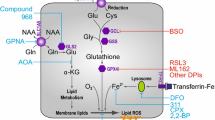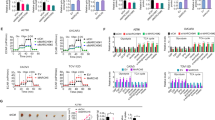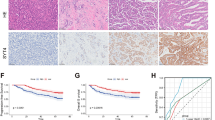Summary
In this study, we examined the sensitivity of pancreatic cancer cells to [HuArgI (Co)-PEG5000]-induced arginine deprivation as well as the mechanisms underlying deprivation-induced cell death. [HuArgI (Co)-PEG5000]-induced arginine deprivation was cytotoxic to all cell lines tested with IC50 values in the pM range at 72 h post-treatment. Three of the five cell lines were rescued by the addition of excess L-citrulline and expressed ASS1, indicating partial arginine auxotrophy. The remaining two cell lines, on the other hand, were not rescued by the addition of L-citrulline and did not express ASS1, indicating complete auxotrophy to arginine. In addition, all cell lines exhibited G0/G1 cell cycle arrest, in the surviving cell fraction, at 72 h following arginine deprivation. Analysis of the type of cell death revealed negative staining for annexin V and a lack of caspase activation in all five cancer cell lines, following treatment, indicating that arginine deprivation leads to caspase-independent, non-apoptotic cell death. Finally, we demonstrated that arginine deprivation leads to a marked activation of autophagy and that inhibition of this autophagy greatly decreases cytotoxicity, indicating that arginine deprivation induces autophagic cell death in pancreatic cancer cells. We have shown that pancreatic cancer cells are auxotrophic for arginine and sensitive to [HuArgI (Co)-PEG5000]-induced arginine deprivation, hence demonstrating that arginine deprivation is a potentially potent and selective treatment for pancreatic cancer. We have also demonstrated that autophagy is activated following arginine-deprivation and that its prolonged activation leads to autophagic cell death.






Similar content being viewed by others
References
Chand S, O'Hayer K, Blanco FF, Winter JM, Brody JR (2016) The landscape of pancreatic Cancer therapeutic resistance mechanisms. Int J Biol Sci 12(3):273–282
Liu Q, Stewart J, Wang H, Rashid A, Zhao J, Katz MH, Lee JE, Fleming JB, Maitra A, Wolff RA, Varadhachary GR, Krishnan S, Wang H (2017) Reduced expression of argininosuccinate synthetase 1 has a negative prognostic impact in patients with pancreatic ductal adenocarcinoma. PLoS One 12(2)
Jemal A, Siegel R, Xu J, Ward E (2010) Cancer statistics, 2010. CA Cancer J Clin 60(5):277–300
Siegel R, Ward E, Brawley O, Jemal A (2011) Cancer statistics, 2011: the impact of eliminating socioeconomic and racial disparities on premature cancer deaths. CA Cancer J Clin 61(4):212–236
Shen LJ, Lin WC, Beloussow K, Shen WC (2003) Resistance to the anti-proliferative activity of recombinant arginine deiminase in cell culture correlates with the endogenous enzyme, argininosuccinate synthetase. Cancer Lett 191(2):165–170
Shen LJ, Beloussow K, Shen WC (2006) Modulation of arginine metabolic pathways as the potential anti-tumor mechanism of recombinant arginine deiminase. Cancer Lett 231(1):30–35
Manca A, Sini MC, Izzo F, Ascierto PA, Tatangelo F, Botti G, Gentilcore G, Capone M, Mozzillo N, Rozzo C, Cossu A, Tanda F, Palmieri G (2011) Induction of arginosuccinate synthetase (ASS) expression affects the antiproliferative activity of arginine deiminase (ADI) in melanoma cells. Oncol Rep 25(6):1495–1502
Cheng PN-M, Lam T-L, Lam W-M, Tsui S-M, Cheng AW-M, Lo W-H et al (2007) Pegylated recombinant human Arginase (rhArg-peg5,000mw) inhibits the in vitro and in vivo proliferation of human hepatocellular carcinoma through arginine depletion. Cancer Res 67(1):309–317
Yoon CY, Shim YJ, Kim EH, Lee JH, Won NH, Kim JH, Park IS, Yoon DK, Min BH (2007) Renal cell carcinoma does not express argininosuccinate synthetase and is highly sensitive to arginine deprivation via arginine deiminase. Int J Cancer 120(4):897–905
Hernandez CP, Morrow K, Lopez-Barcons LA, Zabaleta J, Sierra R, Velasco C, Cole J, Rodriguez PC (2010) Pegylated arginase I: a potential therapeutic approach in T-ALL. Blood. 115(25):5214–5221
Glazer ES, Stone EM, Zhu C, Massey KL, Hamir AN, Curley SA (2011) Bioengineered human arginase I with enhanced activity and stability controls hepatocellular and pancreatic carcinoma xenografts. Transl Oncol 4(3):138–146 Epub 2011 Jun 1
Tanios R, Bekdash A, Kassab E, Stone E, Georgiou G, Frankel AE, Abi-Habib RJ (2013) Human recombinant arginase I(co)-PEG5000 [HuArgI(co)-PEG5000]-induced arginine depletion is selectively cytotoxic to human acute myeloid leukemia cells. Leuk Res 37(11):1565–1571
Khoury O, Ghazale N, Stone E, El-Sibai M, Frankel AE, Abi-Habib RJ (2015) Human recombinant arginase I (co)-PEG5000 [HuArgI (co)-PEG5000]-induced arginine depletion is selectively cytotoxic to human glioblastoma cells. J Neuro-Oncol 122(1):75–85. https://doi.org/10.1007/s11060-014-1698-5. Epub 2015 Jan 8
Nasreddine G, El-Sibai M, Abi-Habib RJ (2019) Cytotoxicity of [HuArgI (co)-PEG5000]-induced arginine deprivation to ovarian Cancer cells is autophagy dependent. Investig New Drugs. https://doi.org/10.1007/s10637-019-00756-w
Stone EM, Glazer ES, Chantranupong L, Cherukuri P, Breece RM, Tierney DL, Curley SA, Iverson BL, Georgiou G (2010) Replacing Mn(2+) with co(2+) in human arginase i enhances cytotoxicity toward l-arginine auxotrophic cancer cell lines. ACS Chem Biol 5(3):333–342
Wang Z, Shi X, Li Y, Fan J, Zeng X, Xian Z, Wang Z, Sun Y, Wang S, Song P, Zhao S, Hu H, Ju D (2014) Blocking autophagy enhanced cytotoxicity induced by recombinant human arginase in triple-negative breast cancer cells. Cell Death Dis 5:e1563
Ascierto PA, Scala S, Castello G, Daponte A, Simeone E, Ottaiano A, Beneduce G, De Rosa V, Izzo F, Melucci MT, Ensor CM, Prestayko AW, Holtsberg FW, Bomalaski JS, Clark MA, Savaraj N, Feun LG, Logan TF (2005) Pegylated arginine deiminase treatment of patients with metastatic melanoma: results from phase I and II studies. J Clin Oncol 23(30):7660–7668
Bekdash A, Darwish M, Timsah Z, Kassab E, Ghanem H, Najjar V, Ghosn M, Nasser S, El-Hajj H, Bazerbachi A, Liu S, Leppla SH, Frankel AE, Abi-Habib RJ (2015) Phospho-MEK1/2 and uPAR expression determine sensitivity of AML blasts to a Urokinase-activated Anthrax lethal toxin (PrAgU2/LF). Transl Oncol 8(5):347–357
Kassab E, Darwish M, Timsah Z, Liu S, Leppla SH, Frankel AE, Abi-Habib RJ (2013) Cytotoxicity of anthrax lethal toxin to human acute myeloid leukemia cells is nonapoptotic and dependent on extracellular signal-regulated kinase 1/2 activity. Transl Oncol 6(1):25–32
Bowles TL, Kim R, Galante J, Parsons CM, Virudachalam S, Kung HJ, Bold RJ (2008) Pancreatic cancer cell lines deficient in argininosuccinate synthetase are sensitive to arginine deprivation by arginine deiminase. Int J Cancer 123(8):1950–1955
Kim RH, Coates JM, Bowles TL, McNerney GP, Sutcliffe J, Jung JU, Gandour-Edwards R, Chuang FY, Bold RJ, Kung HJ (2009) Arginine deiminase as a novel therapy for prostate cancer induces autophagy and caspase-independent apoptosis. Cancer Res 69(2):700–708
Syed N, Langer J, Janczar K, Singh P, Lo Nigro C, Lattanzio L, Coley HM, Hatzimichael E, Bomalaski J, Szlosarek P, Awad M, O'Neil K, Roncaroli F, Crook T (2013) Epigenetic status of argininosuccinate synthetase and argininosuccinate lyase modulates autophagy and cell death in glioblastoma. Cell Death Dis 4:e458
Macintosh RL, Timpson P, Thorburn J, Anderson KI, Thorburn A, Ryan KM (2012) Inhibition of autophagy impairs tumor cell invasion in an organotypic model. Cell Cycle 11(10):2022–2029
Bean GR, Kremer JC, Prudner BC, Schenone AD, Yao JC, Schultze MB, Chen DY, Tanas MR, Adkins DR, Bomalaski J, Rubin BP, Michel LS, Van Tine BA (2016) A metabolic synthetic lethal strategy with arginine deprivation and chloroquine leads to cell death in ASS1-deficient sarcomas. Cell Death Dis 7(10):e2406
Lin C, Wang Z, Li L, He Y, Fan J, Liu Z, Zhao S, Ju D (2015) The role of autophagy in the cytotoxicity induced by recombinant human arginase in laryngeal squamous cell carcinoma. Appl Microbiol Biotechnol 99(20):8487–8494
Delage B, Luong P, Maharaj L, O'Riain C, Syed N, Crook T, Hatzimichael E, Papoudou-Bai A, Mitchell TJ, Whittaker SJ, Cerio R, Gribben J, Lemoine N, Bomalaski J, Li CF, Joel S, Fitzgibbon J, Chen LT, Szlosarek PW (2012) Promoter methylation of argininosuccinate synthetase-1 sensitizes lymphomas to arginine deiminase treatment, autophagy and caspase-dependent apoptosis. Cell Death Dis 3:e342
Changou CA, Chen YR, Xing L, Yen Y, Chuang FY, Cheng RH, Bold RJ, Ann DK, Kung HJ (2014) Arginine starvation-associated atypical cellular death involves mitochondrial dysfunction, nuclear DNA leakage and chromatin autophagy. Proc Natl Acad Sci U S A 111(39):14147–14152
Funding
The work was supported by intramural funding from the Department of Natural Sciences of the Lebanese American University.
Author information
Authors and Affiliations
Corresponding author
Ethics declarations
Conflict of interest
Author Nathalie Khalil declares that she has no conflict of interest. Author Ralph J. Abi-Habib declares that he has no conflict of interest.
Ethical approval
This article does not contain any studies with human participants or animals performed by any of the authors.
Informed consent
For this type of study, formal consent is not required.
Additional information
Publisher’s note
Springer Nature remains neutral with regard to jurisdictional claims in published maps and institutional affiliations.
Rights and permissions
About this article
Cite this article
Khalil, N., Abi-Habib, R.J. [HuArgI (co)-PEG5000]-induced arginine deprivation leads to autophagy dependent cell death in pancreatic cancer cells. Invest New Drugs 38, 1236–1246 (2020). https://doi.org/10.1007/s10637-019-00883-4
Received:
Accepted:
Published:
Issue Date:
DOI: https://doi.org/10.1007/s10637-019-00883-4




